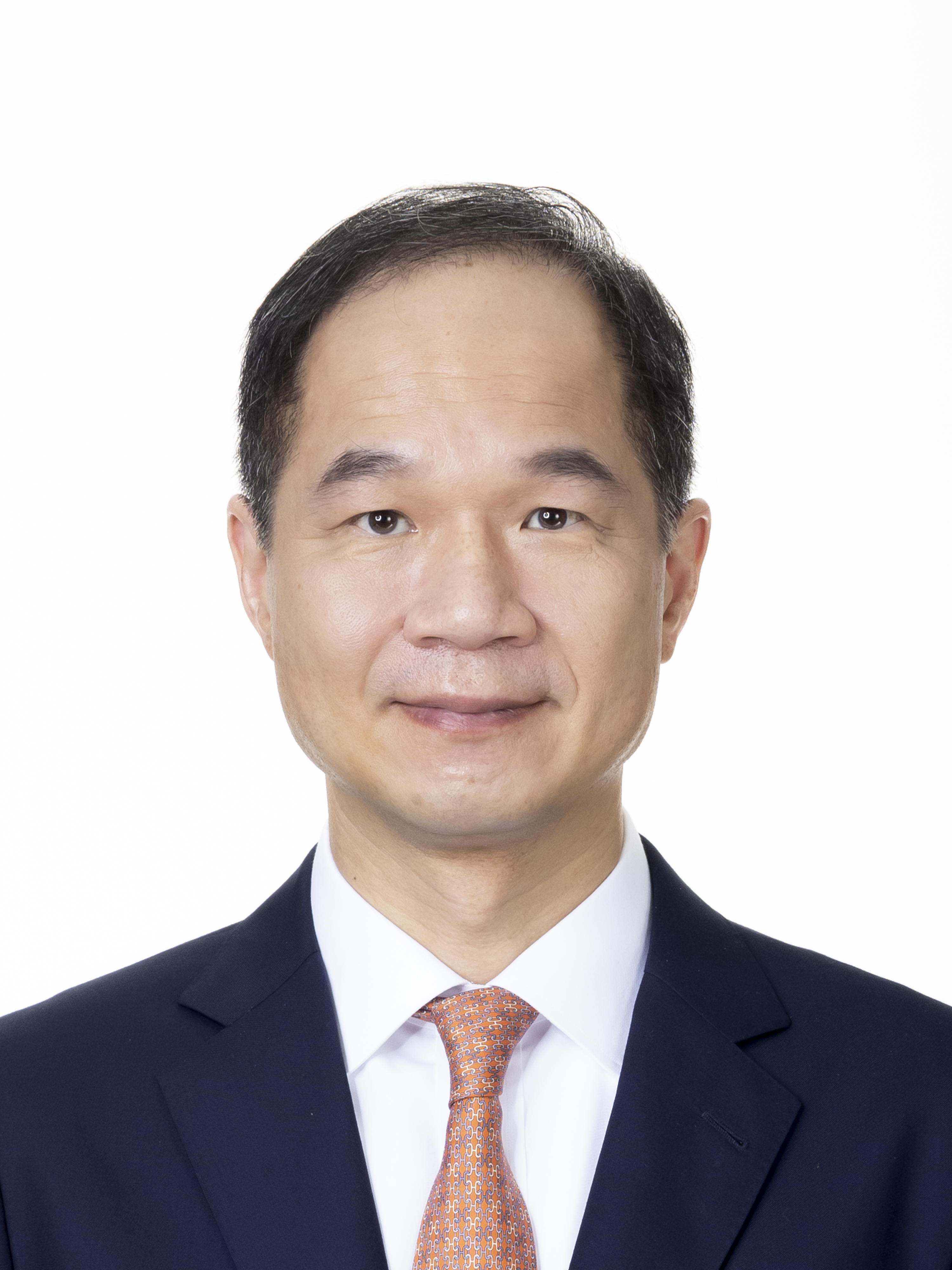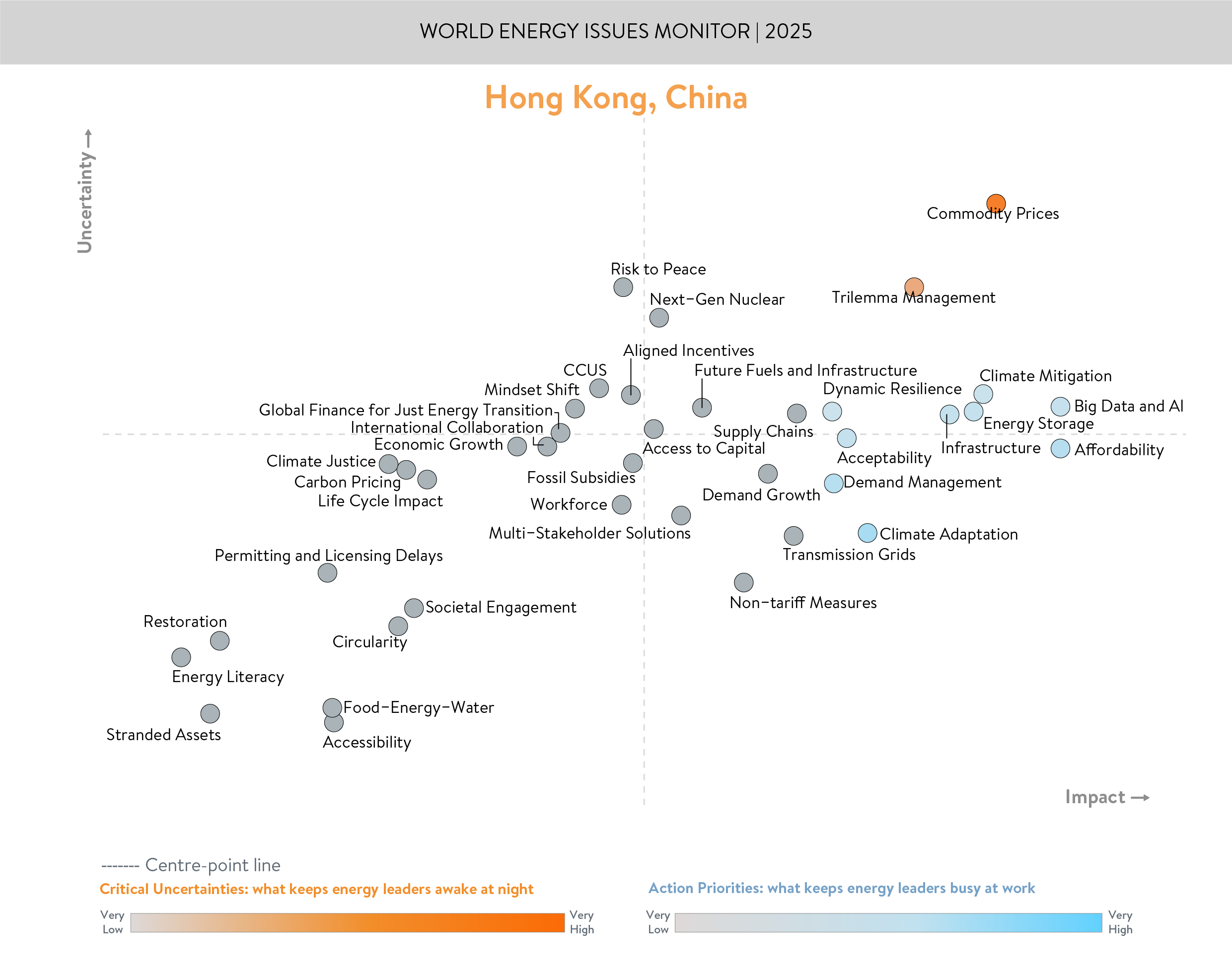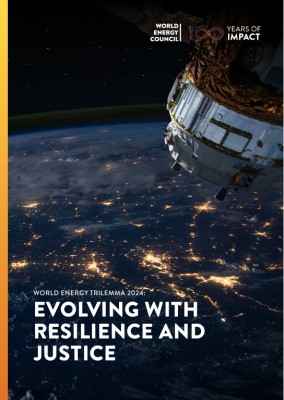The Hong Kong Member Committee of the World Energy Council has been part of the World Energy Council family for over a decade. Their members are composed of electric and gas utilities as well as a power equipment manufacturer.

Mr Chiang is the Chief Executive Officer and Executive Director of CLP Holdings Limited, responsible for the overall performance of the Group. Prior to assuming his role as Chief Executive Officer - Designate on 1 July 2023, he was the Managing Director of CLP Power Hong Kong Limited (CLP Power) since 2017, holding the overall responsibility for CLP’s Hong Kong business, which includes a vertically integrated electricity utility serving over 6 million people.
Mr Chiang is a Fellow of the Hong Kong Institution of Engineers, a Chartered Engineer, a member of the Institution of Engineering and Technology and an Honorary Fellow of the Vocational Training Council. He is currently a member of the HKSAR Election Committee and a member of the Engineers Registration Board. He holds committee roles with the Hong Kong Management Association, Hong Kong Trade Development Council and Community Chest of Hong Kong. He is also a member of the Advisory Committee of the School of Energy and Environment of the City University of Hong Kong and a member of the advisory board of the MBA Programmes at The Chinese University of Hong Kong. He is a member of the 14th Beijing Municipal Committee of the Chinese People's Political Consultative Conference.
Mr Chiang joined CLP Power as a Graduate Trainee in 1988. He has extensive experience in power generation, transmission and distribution systems as well as regulatory strategy. He has held various posts in different areas including power system asset management, planning, design, operation and maintenance, power quality, and corporate and regulatory strategy.
He holds a Bachelor of Science in Electrical & Electronic Engineering from the University of Hong Kong, a Master of Science in Electrical Engineering from the Hong Kong Polytechnic University and a Master of Business Administration from the Chinese University of Hong Kong.
Energy in Hong Kong

ENERGY ISSUES IN MOTION
Hong Kong's energy market is sensitive to fluctuations in international commodity prices due to its dependence on imports. The city has limited local energy resources and relies on imported coal, gas and nuclear power to meet energy needs. As a result, changes in global commodity prices impact consumers and can have a detrimental effect on the affordability of energy. An action priority has been to mitigate these uncertainties, and various measures are being explored, all of which are consistent with decarbonising energy supply. These include further diversifying sources of energy supply, enhancing regional cooperation, and investing in technologies.
Since the last iteration of the World Energy Issues Monitor, plans to diversify energy sources have continued by increasing the use of natural gas to displace coal for electricity generation, commencing operation of the first offshore LNG terminal and importing more zero-carbon energy from Mainland China through regional cooperation. Despite these steps forward, uncertainty remains. This sentiment is largely due to prices of LNG being subject to global market dynamics, geopolitical tensions, and supply chain disruptions. Over a longer time horizon, the development of green hydrogen to decarbonise hard-to-abate sectors, including blending hydrogen into natural gas for power generation, is in progress. The success of these initiatives depends on the eventual availability and affordability of green hydrogen and its derivatives. Commodity prices therefore remain a critical uncertainty in the 2025 Hong Kong Energy Issues Map.
FROM BLIND SPOTS TO BRIGHT SPOTS
Hong Kong has made notable progress in certain areas, which can be considered bright spots. The Climate Action Plan 2050 sets a vision of "Zero-carbon Emissions • Liveable City • Sustainable Development" and outlines strategies to halve carbon emissions by 2035 and achieve carbon neutrality before 2050. This comprehensive plan can serve as a model for other countries. The plan includes a four-pronged strategy: net-zero electricity generation, green buildings, green transport, and waste reduction. For example, the government is enhancing regional cooperation on zero-carbon energy, improving energy efficiency in both new and existing buildings, decarbonizing the vehicle fleet, and transforming the waste management system.
As in other jurisdictions, decarbonisation of electricity has been at the forefront of progress, with the sector having reduced emissions by over 30% from the 2014 peak. With clear plans in place to further reduce emissions from electricity, the focus is shifting towards transport, the sector accounting for the second largest proportion of greenhouse gas emissions in the city. In this context, potential blind spots are related to infrastructure action planning for electrification of transport as well as future fuels and related infrastructure for the harder-to-abate segments of marine and air transport. Nevertheless, recently published plans for green maritime fuels constitute a bright spot worthy of consideration in other jurisdictions, as highlighted below.
Transport Electrification: To best leverage the electricity system in decarbonising transport, international experience shows a taskforce consisting of inter-departmental government and key industry stakeholders would help coordinate and accelerate planning, permitting and implementation across a complex stakeholder landscape. The vast majority of newly registered private vehicles in the city are already electric, with one of the highest uptake rates globally. Such a taskforce would assist in extending this success to commercial vehicles, harbour ferries and shore-to-ship power.
Green Marine Fuels: As an Associate Member of the International Maritime Organisation (IMO) and home to one of the world’s top container ports by volume, Hong Kong plans to follow the IMO’s target of achieving net-zero carbon emissions from international shipping. The government published its Action Plan on Green Maritime Fuel Bunkering in 2024, setting out ten clear actions to progress towards provision of different green fuels for and play its role in meeting the IMO target.
Sustainable Aviation Fuels (SAF): Hong Kong International Airport is in the top ten globally for passenger traffic and regularly serves the world’s most cargo. Decarbonisation of aviation is challenging, and actions are at a nascent stage. However, bright spots are emerging with the establishment of a Hong Kong SAF coalition, comprised of key regional stakeholders, and the announcement by policy makers of plans to set SAF usage targets by the end of 2025. To achieve targets, a levy on passengers has been shown elsewhere to be effective in funding the transition and the appropriate blending infrastructure will need to be in place.
Overall, whilst challenges remain, Hong Kong's proactive plans, measures and successful initiatives provide valuable lessons for other countries aiming to achieve a balanced and sustainable energy future.
ADDRESSING CRITICAL UNCERTAINTIES TO BALANCE THE WORLD ENERGY TRILEMMA
The main uncertainties and priority issues impacting dimensions of the World Energy Trilemma are multifaceted. For Energy Security, the reliance on imported energy sources poses a significant challenge, making Hong Kong vulnerable to external supply disruptions. The high costs and technical complexities of infrastructure development, along with the city's continued dependence on imported energy, are also critical issues. For Energy Equity, maintaining affordability and accessibility of energy for all residents is a priority. Global commodity prices impact Hong Kong’s energy equity, and the government is implementing policies to ensure electricity supply reliability and affordability. For Environmental Sustainability, the need to reduce carbon emissions, manage climate change impacts, and transition to non-carbon energy sources are pressing concerns. Hong Kong has achieved a reduction in carbon emissions since its peak in 2014 and is on track to meet its targets to half emissions by 2035 and achieve carbon neutrality by 2050, largely through decarbonisation of energy in electricity and transport.
Acknowledgements
Hong Kong Member Committee
Downloads

Hong Kong World Energy Issues Monitor 2025 Country Commentary
Download PDF
World Energy Issues Monitor 2025
Download PDF
Hong Kong World Energy Trilemma Country Profile
Download PDF







